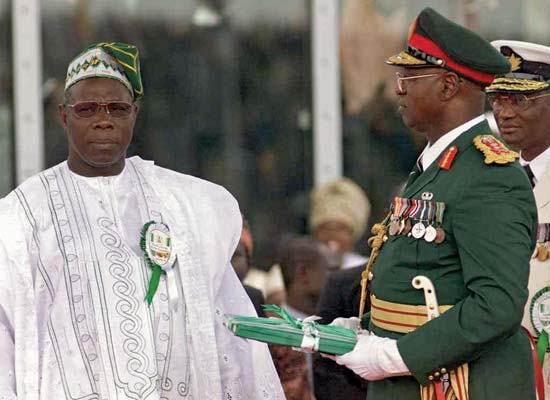Nigeria is a democracy, yet the elevating attributes of the system are observed in the breach.
By Soji Akinrinade
If anything, Nigeria’s return to democracy in 1999 was expected to herald the coming of a new crop of politicians who had learnt their lessons from past failures and had purged themselves of anti-democratic tendencies and practices. Elections were expected to be cleaner and fairer, while politicians and the general population were to have learnt that the reward of democratic chaos was usually a return to the rule of the jackboots. In addition, good governance underpinned by the observance of the rule of law was expected to be the by-product of Nigeria’s new dalliance with democracy. Evidence so far in nearly 25 years of democracy shows that while some progress has been made, there’s still much left to be desired about democratic practice in Nigeria.
As Senator Abdullahi Adamu, former chairman of the All Progressives Party, APC, told Newswatch Plus, “I believe we should have done better. The reason we are not doing any better is that we are the architects of our failure. Democracy depends on us to succeed.”
General Alani Akinrinade, a former chief of army staff and pro-democracy activist under the aegis of the National Democratic Coalition, NADECO, echoed the same view. He told Newswatch Plus, “When we look at the journey till date, I find that the last time we had real democracy was before the coup of 1966, the first coup de’tat because then there seemed to be every effort made, at least at the regional level, not just to make representation very general and very intimate to people, but also to allow Nigerians to elect people of their choice.”
So, what has happened? The presidential elections of 1999 were the harbinger of what Nigerians could expect from the country’s return to democratic practice. Rather than a situation where elections are conducted with decorum and political activists are ready to accept defeat and move on, the political atmosphere has been fraught, almost always bringing the country to a crisis at each election cycle.
A common feature of elections since 1999 has been allegations of electoral fraud, real, imagined, or cooked up. The situation has grown so much worse that in recent elections the courts have been pushed to the position of determining the victors of electoral contests, thus sidelining the voters and leaving them powerless. Yet the courts are blamed for partiality and for interfering in Nigeria’s democracy.
It all started early. In 1999, the election for the presidency between General Olusegun Obasanjo of the Peoples’ Democratic Party, PDP and Olu Falae, a renowned economic manager and former secretary to the government of General Ibrahim Babangida, who contested on the joint platform of the Alliance for Democracy, AD, and the All People’s Party, APP, was rubbished by allegations of electoral fraud and other unseemly malpractice. It was the first sign that the politicians had learnt nothing and forgotten nothing.
In a 13-page petition contesting the election of Obasanjo, Falae alleged that the president-elect was not qualified to stand for the election because he was a member of the Ogboni, a secret society. The petition also claimed that Obasanjo had been found guilty of treason and treasonable felony by a military tribunal. Of course, this discounted the fact that the government of Abdulsalami Abubakar granted Obasanjo a state pardon upon release from prison.
Falae’s petition also claimed that Obasanjo was a public officer by his membership of the National Council of State, being a former head of state. The petition further claimed that Obasanjo distributed free rice, garri, and salt in bags inscribed with “Vote for Obasanjo” with PDP’s umbrella symbol to voters in public places to induce them to vote for him. The petition further alleged that there was corrupt practice in Obasanjo’s camp contrary to Decree No. 6 of 1999 and that Obasanjo provided an “unreasonable huge donation” to the PDP, opinion leaders, and key functionaries to enable party agents, and public office holders within the party to induce voters all over the country to vote for him.
The petition stated: “The first respondent (Obasanjo) paid millions of naira to these agents and public officials in the runup to the presidential elections.” Falae’s petition averred that Obasanjo, through his agents gave sums of money ranging from N25 to N1,000 to intending voters to vote for him. The AD/APP candidate also alleged that the election was mismanaged and compromised such that the ballot papers that were not used were not returned to the Independent Electoral Commission, INEC, but vanished completely The states where such irregularities were said to have occurred were Niger, Edo, Taraba, Ebonyi, Kaduna, Katsina, Kwara, Jigawa, Plateau, Nasarawa, Bauchi, Enugu, Adamawa, Gombe, Benue, Cross River, Akwa Ibom, Borno, Delta, Bayelsa, and Rivers. Votes were allegedly inflated, wrongly thumbprinted and agents of Falae’s party chased away on election day.
Falae, claimed, in his petition, that he scored 11,627,789 votes as against Obasanjo’s 7,262,348, urging the court to pronounce him and not Obasanjo, the duly elected president of Nigeria.
Falae’s petition did not succeed and was thrown out for lack of merit, but the petition practically set a pattern that had been followed in election cycles since 1999. Challenges to elections at all levels have ballooned since then. It is what Senator Adamu describes as the unwillingness of political candidates to accept the results of elections. They have no tolerance, he believes. The situation has become so bad that we now have a plethora of litigations. In the six years ending in 2023, it is alleged that there have been at least 5,000 electoral cases, while the 2023 elections alone have spurred more than 1,700 cases. It shows a total lack of belief in the electoral system. It also shows that from the first elections in 1999, subsequent elections have even been more disputed. For a while, at least until the 2023 elections, some Nigerians have held the elections of 2007 as the worst that the nation has ever had. The elections brought in the Umaru Musa Yar’Adua and Goodluck Jonathan government. The election campaigns at the time lacked decorum as candidates lobbed political bombs of allegations, real or imagined, at each other. In fact, during the campaign, former President Obasanjo said, “This election is a do-or-die affair for me and for PDP. This coming election is a matter of life and death for the PDP and Nigeria.” It was a statement that captured the mood of the time but which the former president has been unable to live down.
While his do-or-die statement referenced his view that those who would “drag the nation backward” should be prevented from coming to power, it was debatable whether the political class believed that his PDP government had moved the nation forward. Such was the acrimony and the challenges that followed the 2007 elections that President Yar’Adua, at his inauguration conceded that the elections that brought him to power had severe shortcomings.
In 2008, at a consultative meeting on the electoral process in Nigeria with state governors, the leadership of political parties that won elections in one state or more, the National Assembly leaders, and the heads of the security agencies, President Yar’Adua, as recalled in Power, Politics, and Death, by ace journalist, Segun Adeniyi, told some home truths. He said, “If we will be honest with ourselves, we all know how we rig elections in this country. We compromised the security agencies, we pay electoral officials and party agents while on the eve of the election, we merely distribute logistics all designed to buy votes…”
The late president, as recounted in the book, spoke candidly for about 20 minutes on methods usually adopted “to manipulate elections, stopping occasionally to ask rhetorically whether his observations were false. Nobody controverted him, and so he concluded by telling the participants that collectively, they should lay a new foundation for democracy in the country if the political elite had the will.”
He was only three months into his administration when he set up the Uwais electoral committee to identify lapses and inadequacies “that have stifled the yearning for free and fair elections in Nigeria.” Many years later, the proposed reforms by the 22-member reform committee led by the former Chief Justice of Nigeria, are still gathering dust because the political elite do not have the will to implement them.
Rather, things have gotten worse in the subsequent years, with every election in Nigeria being described as the “worst ever.” The sobriquet is what has been given to the recent 2023 elections. Widespread rigging and fraud were alleged during the elections, which many still believe are better than recent elections because of the changes made to the electoral law.
Nevertheless, it is fair to say that not many, except those who benefit from the elections, are happy with the state of things. Former Senate president Ameh Ebute told Newswatch Plus, “I believe most Nigerians, the governing and the led, politicians as well as observers of our ongoing political development, will agree with me that the democratic Nigeria of our dream is where the rule of law will determine and prevail in governance; where social justice will be the order of the day and where minority rights will not be permanently subsumed or subjugated by majority rights. The terrifying thing about our democracy, as we speak, is that everything is not by the rule of money. All over the place, we seem to have forgotten about the culture of political sagacity and decorum. Quite frightening, to say the least.”
The major problem, and one which is getting worse, is that elections that are not underpinned by widespread acceptability have a heavy baggage for good governance. In the nearly 25 years of Nigeria’s return to democracy, good governance has become the causality, particularly, with governments that have been burdened by problems of legitimacy struggling to operate in the democratic space. Thus, democracy in Nigeria has witnessed many aberrations in different parts of the country with the orchestrated impeachment of state governors in an undemocratic manner, sometimes, at the prompting of the federal government. This was particularly prevalent when President Olusegun ruled the roost from 1999 to 2007. State governors themselves behaved and have continued to do so as if they were Lords of the Manor.
Governors and their successors have been at loggerheads in many states, distorting the political atmosphere and heating up the polity. Many former governors still want to be relevant in their states and are unwilling to give a free hand to their successors. This has played out in many states in the past 24 years and it is playing out, at the moment, in Rivers State, where the newly elected governor, Siminalayi Joseph Fubara is at daggers drawn with his predecessor Nyesom Wike, who is now minister of the Federal Capital Territory.
How to make Nigerian democracy functional, in all ramifications, is now a major issue that the nation faces.
According to Senator Adamu, “We need to be a little more honest with ourselves, but we are not, unfortunately. We need a little more honesty of purpose if we are going to develop this thing called democracy. We have to now take another look at it and see how we fit into it, not democracy fitting us; then maybe we can make some progress.



